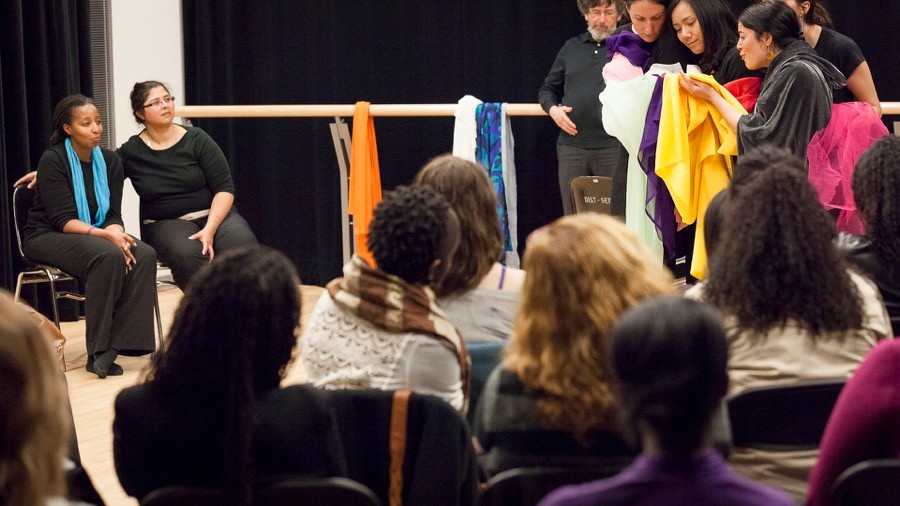Lisa Ndejuru is a 2017 Concordia Public Scholar. She’s also a core member of the Centre for Oral History and Digital Storytelling. Lisa aims to make sense of her research and complete her dissertation later this year.
Blog post
Delicious!
 Photo by David Ward
Photo by David Ward
Last Friday I participated in a free online writing retreat, for the whooole day. Dr Michelle Boyd founder of Inkwell academic retreats offers one free Still I write online retreat every semester. She wants "to be able to support any scholar, regardless of their financial situation”. Just the name of the retreat made me happy :)
Core to Dr Boyd's method is the aim of reconnecting with the depth of one's work, and feeling replenished rather than tapped out at the end of the day. It was lovely! I registered and had immediate access to my online space and a little parcours of documents introducing me to what to expect, the structure of the day and what I might do to prepare for it. By Friday, I had really attuned to the experience: I had actually set aside the whole day. (I know this is what should be happening every day in this dissertation writing phase, but that is not actually what is going on for me). I took over one of the two small closed spaces in FB 630, a beautiful and quiet study room for graduate students in the fine arts and humanities. (I like to dictate and that way I don't bother others). All my books were out. Water, fruit and lunch were ready in the kitchen.
The day went from 10am to 6pm and was structured into three phases of one thirty minute coaching call followed by two hours of writing. Coaching call times also served as snack and brown bag lunch times which made for three full and satisfying two-hour chunks of undivided writing time … Delicious!
During the retreat I was indeed able to reconnect with my work. Wanting to make the dissertation meet parameters and expectations, I somewhat lost sight of “why” I wanted to reflect on the many ways we engaged artfully and creatively with life stories of genocide, war and human rights violations during the Montréal life stories project. There was a reason I decided to focus on the research, creation and intervention work we did right here at Concordia’s center for oral history and digital storytelling rather than to study initiatives elsewhere.There was a reason I wanted to work with stories of my own family and my own community, people who live right here in Montreal. I want to stay connected to that and more specifically, it feels important to write from that place of connection.
Of course I didn’t accomplish half of the work I wanted to have done. But that speaks more to the unrealistic nature of my expectations than to the quality of the experience.The process was effective in that it allowed me to settle down and work. I did not feel jumpy, or fragmented as I often do, making it difficult for me to finish my tasks, where at the end of the day, I have not completed my to-do list, nor written.
Reflecting post retreat about what was different about how I worked, I noted that even though I had lots of work left to do, I had allowed myself to sleep the night before. I had also enjoyed thinking about the different ways I wanted to be prepared for the day. I had taken the day off completely! I adhered to the process, and anchored myself to the coaching call times. I allowed myself to do the work that was backlogged and completed it. Which then finally left me free and available to read ( I need those readings for the writing I still need to do). Surprisingly, reading was the most demanding activity and I couldn't actually sustain it for very long at all.
What I knew to be true from my dissertation but became clearer during friday’s process is how the most challenging part of the writing is to create the retreat. To say "no" to anything and everything that wants a piece of us be it online or in person. Be it heroic, legitimate or entirely frivolous. There are millions of other things to do than write: research and teaching assistance, financial obligations, community commitments, family and other relationships…
My take away has been Dr Boyd’s core notions of reconnecting with the depth of the work, of focusing on satisfaction and feeling replenished rather than tapped out at the end of the day. I am actually very lucky: one of my supervisors, Dr. Riley organizes a No Bad News Writing Group for her graduate students every second Friday. We come together at Loyola to briefly offer feedback on each other’s work and then write. All morning. We started two Fridays ago and will go every second Friday. I love the idea that we have this time to get into the “zone”. I am really looking forward to it. And I’m also enjoying building some of what i learned into my daily writing routine.
Bon! ... Onward.
About the author
